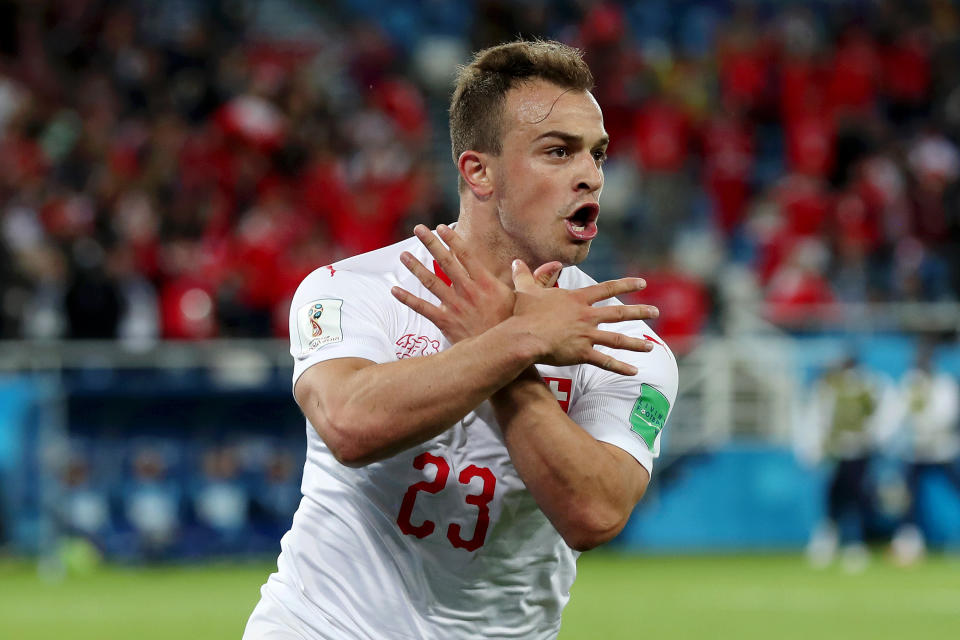Switzerland stars facing possible FIFA suspensions for provocative celebrations vs. Serbia

Switzerland’s two goals in a dramatic comeback win over Serbia on Friday were two of the most political goals in World Cup history.
They were scored by Granit Xhaka and Xherdan Shaqiri, two players of Kosovar Albanian heritage whose families fled Yugoslavia amid oppression of ethnic Albanians by ethnic Serbs in Kosovo. Both celebrated with the “Albanian eagle” gesture, a symbol used in the 90s to display resistance to Serbian/Yugoslav rule.
XHERDAN SHAQIRI!!
He finishes off a long run by slotting it past the keeper to put Switzerland ahead 2-1 late in the game! pic.twitter.com/lK9sJMi3o7
— FOX Soccer (@FOXSoccer) June 22, 2018
So, naturally, Serbs are fuming. Their anger transcends the result of a soccer game. And their protestations could lead to suspensions for both of the Swiss stars.
Serbia coach’s political comparison
The most absurd aspect of the fallout was an Instagram post from Mladen Krstajic that wasn’t directly related to Xhaka’s and Shaqiri’s celebrations. But it was indirectly related.
Krstajic was furious about a second-half no-call when striker Aleksandar Mitrovic was tackled, American football style, while trying to jump for a header. In the Instagram post, Krstajic appeared to compare the lack of video review on the play to the prosecution of Balkan war crimes committed by Serbs.
“Unfortunately, only the Serbs have been convicted of selective justice, once the damn Hague and today in football VAR …” Krstajic wrote in Serbian, roughly translated to English.
A post shared by Mladen Krstajic (@mladenkrstajic20) on Jun 23, 2018 at 3:49am PDT
The post was pretty clearly a reference to the United Nations-established International Criminal Tribunal for the former Yugoslavia, which was based in The Hague, Netherlands. That’s where various Serbian leaders and nationalists were convicted of war crimes committed during Yugoslav wars, including the conflict in Kosovo.
So, in short, Krstajic appears to be saying that Serbia’s national team was selectively and unfairly punished, just like Serbian leaders who were culpable for the deaths of hundreds, and in some cases thousands.
Got it.
Serbian FA calls for punishment
Serbia’s soccer federation also officially protested the non-penalty. “I understand the referee didn’t see it but that is why we have VAR,” the federation’s president, Savo Milosevic, said. “What are those guys doing up there? Do we need another four men up there, do we need 100 people to control VAR for something we can all see perfectly well? We are Serbia and nobody cares, that is all I can think of.”
More interestingly, the federation made the entire country’s anger official when it filed several other complaints to FIFA. One pertains to Shaqiri’s boots – one of which has the Kosovo flag embroidered on the heel.
The complaints also pinpointed “several controversial flags” and the Swiss goal celebrations.
FIFA opens disciplinary proceedings
FIFA had previously cleared Shaqiri to wear the shoes, but does prohibit players “provoking the general public” with their celebrations. So on Saturday, it opened disciplinary proceedings against Xhaka and Shaqiri for the “double eagle” gesture.
If FIFA finds the two players guilty of the dreaded “Article 54” of its disciplinary code, they could be suspended for two matches each. That, at least, is what FIFA’s code calls for. But it would seem to be an excessive punishment.
A win for Kosovo
The win, and the goals, meant more to Xhaka and Shaqiri than any of us could imagine. Xhaka’s father was jailed and beaten as a college student for protesting Yugoslav rule in Kosovo. Shaqiri was born there, but moved to Switzerland as a baby.
They represent Switzerland in soccer, but in a game against the nation that turned their parents into refugees, they also represented Kosovo. Xhaka apparently posted, then deleted, on Instagram a photo of himself doing the double eagle celebration, with a caption that translates roughly to, “Take that Serbia, that’s why they call me Granit Kosovo.”
Og så dukker Xhaka også op på Insta efter kampen. 'Her får i den, Serbien. Det er derfor, de kalder mig Granit Kosovo.' pic.twitter.com/Ds3dD3zgY5
— Arnela Muminović (@muminovic88) June 22, 2018
This, incredibly, was a win for Kosovo as much as one for Switzerland. In the capital, Pristina, Kosovans celebrated in bars and in the streets:
Pristina city center after Switzerland-Serbia pic.twitter.com/Zi7wLqo21M
— Mitra Nazar (@Mitrala) June 22, 2018
For Serbia, on the other hand, Kosovo’s happiness made the defeat twice as enraging. There is still bitterness between the two countries. (Kosovo was formerly part of Serbia, but has since won independence.) Xhaka’s and Shaqiri’s celebrations exacerbated the heartbreak of a damaging defeat.
– – – – – – –
Henry Bushnell covers global soccer for Yahoo Sports. Have a tip? Question? Comment? Email him at henrydbushnell@gmail.com, or follow him on Twitter @HenryBushnell, and on Facebook.
More World Cup on Yahoo Sports:
• Bushnell: The two sides of Toni Kroos and Germany
• Kroos’ dramatic late winner rescues Germany
• FIFA knew of Russian doping, did nothing – report
• Why Swiss goals, celebrations were both political, provocatic



